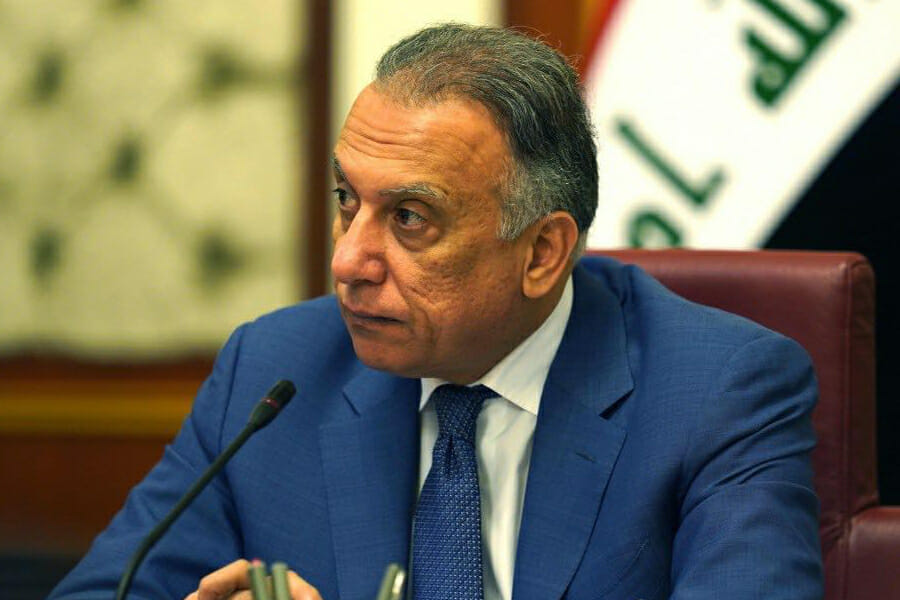
Collapsing Oil Prices and Political Deadlock Leave Iraqi Elites Exposed
As if Iraq, the world’s third-largest oil exporter, did not have enough challenges on its plate with the COVID-19 pandemic driving crude oil prices to historic lows, the most recent chapter of the bitter dispute between Iraq’s central government and the Kurdistan Regional Government (KRG) over revenue from Iraqi Kurdistan’s oil production has led KRG leaders to call for the involvement of international mediators like the United Nations. Earlier this month, Baghdad cut its budget contributions to Erbil after Iraqi Kurdistan did not deliver 250,000 barrels per day to the central government, even demanding the KRG return all payments made since January 2019.
Since the revenue sharing conflict re-erupted last month, the central government has had at least one positive development: the ascension of Mustafa Al-Kadhimi as Iraq’s new prime minister. The former intelligence chief’s endorsement by Parliament brings an end to months of political paralysis after a widespread protest movement against systematic corruption and widespread unemployment brought down his predecessor, Adil Abdul-Mahdi. Al-Kadhimi was President Barham Salih’s third candidate for the post this year, after both former Najaf governor Adnan al-Zurfi and former communications minister Mohammed Tawfiq Allawi failed to secure parliamentary backing.
Iraq as a whole still faces economic disaster, with the World Bank predicting a 9.7% drop in GDP this year. With protests starting afresh and drastically falling revenues likely to exacerbate them, can Al-Kadhimi convince Iraq’s fractious factions to implement long-overdue reforms and bring the country back from the brink? Recent events in Kurdistan do not support an optimistic perspective. Instead, they show how Iraq’s “island of stability” may soon match the chaos of the political situation in Baghdad.
Kurdistan no longer spared
One of the stumbling blocks for Salih’s other candidates was an insistence on challenging political privileges enjoyed by Iraq’s ethnic and religious groups. That institutionalized factionalism is considered non-negotiable by oil-rich Iraqi Kurdistan, which suffered brutal treatment at the hands of Saddam Hussein and has jealously guarded its autonomy since his downfall. While Kurdistan’s separation from Baghdad may have created an aura of stability, another recent energy dispute has exposed long-standing problems of corruption, cronyism, and factionalism.
The gas crisis in question started in early February when two companies, Sur Gas (Sorgas) Company and Golden Jaguar, fought over a tender contract to transport liquified petroleum gas (LPG). The dispute escalated into armed attacks: unidentified men attacked Sorgas’s headquarters on February 1st, briefly detaining its director. The following day, gunmen fired on Sorgas trucks transporting LPG within Kurdistan.
This disruption produced a severe gas shortage in midwinter in the cities of Erbil and Duhok, causing gas canister prices to skyrocket from $6.30 to as much as $42. The implications of this disruption are of course far broader than a temporary price spike. The region’s security and infrastructure are buckling in the face of crisis, leading to power shortages, rising unemployment, and resentment against the region’s elites – much like in the rest of Iraq.
Failures of Kurdistan’s two-family system
The Kurdistan gas crisis also has political ramifications, highlighting the region’s rentier economy and clientelist networks. After the violent conflict over LPG, the KRG was forced to admit that “monopolists and mafias” wield undue influence in the region’s energy sector. The two competing operators are deeply connected via patron-client linkages to rival political factions. Golden Jaguar has links to the Patriotic Union of Kurdistan (PUK), aligned with the Talabani family, while Sorgas is connected to the ruling Kurdistan Democratic Party (KDP), dominated by the Barzani clan.
After the Kurdish civil war in the 1990s, Masoud Barzani’s KDP and Jalal Talabani’s PUK effectively divided Kurdistan into de facto nepotist fiefdoms. The PUK took control of Iraq’s presidency after Saddam’s fall, first under Jalal Talabani and subsequently under Fuad Masum and now Barham Salim. The mostly symbolic office nonetheless has an annual budget of $43 million and little transparency over how that money is spent.
That lack of transparency extends to Kurdistan. In 2017, a $500 million loan taken by the region without parliamentary approval included a mysterious $50 million “signature bonus” credited to an agent of Qubad Talabani. Given Russia’s Rosneft paid $250 million to a “mystery consultant” to secure its stake in Kurdistan’s oil sector, graft in Kurdish public finances appears to be no less egregious than corruption elsewhere in Iraq.
The Barzanis are equally responsible for instituting undemocratic family rule. Members of the Barzani clan hold a vice grip over Kurdistan’s institutions, including the premiership and the KRG security agencies. This tribalization of governance has impacted the whole of Iraq, alienating major foreign investors when the country desperately needs capital.
Personal graft creates systemic issues
In 2018, for example, Sirwan Barzani, cousin of the current KRG president, was sued by Kuwait’s Agility and France’s Orange for his mismanagement of Iraqi telecommunication company Korek, in which the two companies jointly invested $800 million before having their stakes dramatically expropriated by Iraq’s Communications and Media Commission (CMC).
The investors allege Barzani and his associates misappropriated millions of dollars, including by colluding with Lebanon’s IBL Bank to obtain a $150 million loan for Korek at suspiciously high interest. Since then, evidence has emerged that another Korek executive, Lebanese businessman Raymond Samir Zina Rahmeh, allegedly used £2.3 million worth of London real estate to bribe members of the CMC at the same time the commission was deciding the fate of the Orange-Agility joint investment. Those claims are currently being pursued in U.S. federal court, but Sirwan Barzani has already taken ownership of Korek.
Orange and Agility are not the only foreign investors burned by a lack of accountability. The issue is particularly acute in the oil and gas sector. In August 2019, a lawsuit filed at the UK Royal Courts of Justice accused the KRG and former Minister of Natural Resources Abdullah Abdul Rahman Abdullah (also known as Ashti Hawrami) of illegal practices targeting Kurdistan-based Dynasty Petroleum.
The Kurdish official allegedly solicited bribes from Dynasty in exchange for authorizing the company’s purchase of operational licenses in the Topkhana and Kurdamir fields from Spain’s Repsol, as has reportedly been standard practice under Hawrami’s tenure since 2006. According to the lawsuit, Dynasty’s refusal to pay Hawrami saw the company targeted with a campaign of harassment, initiated by none other than KRG Deputy Prime Minister Qubad Talabani.
Kurdistan’s leaders have repeatedly promised to curb this corruption, to no effect. In late 2019, newly appointed KRG Prime Minister Masrour Barzani vowed to curb rampant corruption and implement the rule of law in the oil sector, which accounts for over 80% of the region’s economy. Could the compounding crises now force the KRG to put those promises into action in order to appease a restive public, as well as to mend bridges with Al-Kadhimi’s new government in Baghdad?
If so, there may yet be hope for transparency and diversification in the world’s “last oil frontier.” If not, the whole of Iraq – including its purported island of stability – may be submerged by the global crash.
